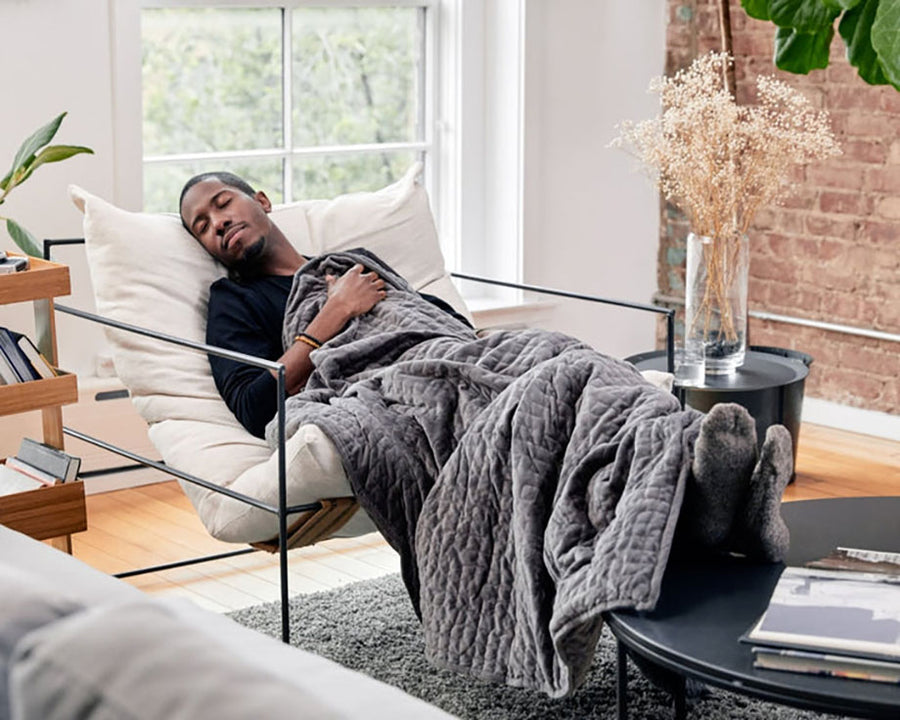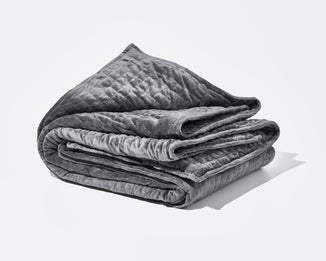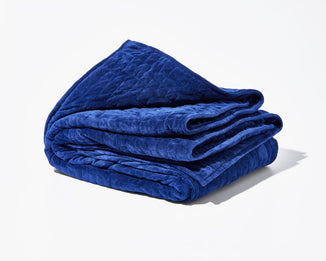
Feb 20, 2022
How to Stop Sleeping on Your Stomach
Did you know that the average person spends less than 10 percent of time asleep on their stomachs? As it turns out, there’s a good reason why most people don’t like to hold this particular sleep position for very long: it’s uncomfortable, bad for your back and reaps the least number of benefits of any other sleep position.

If you spend the majority of your time sleeping on your stomach, you may be wondering if there’s a way to switch up your sleeping position to achieve a more comfortable night’s snooze. Well, we have good news — there is! And it could be as simple as investing in a body pillow or sleeping with a weighted throw blanket.
In this guide, we’ll explain the potential drawbacks of sleeping in the front position and provide a few tips on how to stop sleeping on your stomach.
Shop Our Weighted Throw BlanketsThe Problem with Sleeping on Your Stomach
While stomach sleeping can help with sleep apnea, it’s generally not recommended for the following reasons:
- It hurts your neck and spine. According to the Sleep Foundation, stomach sleeping provides the least amount of support for your back and puts a lot of pressure on your spine. When you sleep on your stomach, you have to turn your head to the side to breathe, which ends up twisting your neck and spine out of alignment.
- It gets in the way of a good night’s rest. Most people can’t stay in a stomach sleeping position for a long time — not comfortably, anyway. Inevitably, you’ll find yourself tossing and turning all night to relieve the pain, which can lead to chronic sleep deprivation. Even worse, you may feel stiff and sore upon waking up in the morning.
- It’s not ideal during pregnancy. Getting quality sleep during pregnancy can be a Herculean task, but it’s especially challenging when you’re a stomach sleeper. At some point during your pregnancy, you’ll need to train yourself to sleep on your back or run the risk of not getting quality shut-eye in the later stages of pregnancy.
Related Reading: What Is the Best Sleeping Position?
How to Stop Sleeping on Your Stomach
If your stomach sleeping habit is starting to negatively impact your sleep and health, you might consider training yourself to sleep in a different position. Here are a few suggestions to help you stop sleeping on your stomach.
Tip #1: Sew a tennis ball into the front of an old t-shirt
The old “tennis ball in a t-shirt” trick was originally invented as a way to help discourage sleep apnea sufferers from rolling over onto their backs to sleep, but it works equally well for stomach sleepers. With this method, you sew a tennis ball into the front of an old sleep shirt and wear it to bed. The idea is that the ball will make it too uncomfortable for you to sleep on your stomach.
Don’t have basic sewing skills? You can also buy an anti-snoring backpack and wear it backwards.
Tip #2: Use weighted products to discourage tossing and turning
Some people manage to train themselves to stay on their back or side all night through willpower alone, while others need a little bit of assistance. If you think you fall into the latter category, you might try sleeping under a weighted throw blanket. Designed to deliver calming pressure to the body, these therapeutic blankets help ground your body downwards, which may make you less likely to revert back to your stomach sleeping position. They can also help you fall asleep faster in your new sleeping position, thanks to their ability to soothe high levels of anxiety and arousal.
Tip #3: Cozy up to a full-body pillow
Whether you’re trying to support healthy spinal alignment, relieve pressure from your joints or get more comfortable sleep during pregnancy, a body pillow is a smart investment. These long, narrow pillows can help improve the quality of your sleep by increasing overall comfort during the night and keeping your spine in a neutral position. Body pillows may be particularly beneficial to stomach sleepers because they can help train you to sleep on your side, which is the most common sleeping position.

Tip #4: Practice good sleep hygiene
It may sound overly simplistic, but practicing basic sleep hygiene can go a long way in helping you remain in a back or side sleeping position all night long. For a better night’s sleep, try these tips:
- Create a cozy sleep environment. Invest in comfortable bedding and the best mattress you can afford. (Trust us, it will be money well spent.)
- Find ways to relax before bed. Wind down with a cup of tea and a good book. (Hint: Want to sleep like a baby? Wear a weighted eye mask and let yourself sink into a state of relaxation.)
- Turn off electronics. Try to put your electronics away at least one hour before you decide to hit the hay.
- Be consistent. Going to bed at the same time every day will optimize your circadian rhythm, making it easier to drift off to sleep in your new sleep position.

Sleep Smarter with Gravity Blankets
You probably know that belly sleeping isn’t doing your sleep or your health any favors. But when you’ve slept on your stomach your entire life, switching to a new position can be difficult. That’s where Gravity Blankets can help. Our high-quality weighted blankets utilize the power of deep touch pressure to take sleep and relaxation to a whole new level. Try our weighted products today and experience the difference for yourself!
Your use of this website, its content, and any products obtained through this website is at your own risk. This website, its content, and any products obtained through this website are provided on an “as is” basis, without any warranties of any kind, either express or implied, including warranties of merchantability, infringement of intellectual property, or fitness for any particular purposes. No warranty or representation is made with respect to the completeness, reliability, quality, or accuracy of this website or its content. This website, its content, and any products obtained through this website do not constitute medical treatment and is not a substitute for a medical examination or diagnosis. If you are dealing with a health condition check with your health care provider before using. This website may contain affiliate links that allow us to earn a commission on purchases made through such links. We may accept forms of advertising or sponsorships in connection with this website. There might also be paid topic insertions. We may accept and keep free products, services, and other forms of compensation from others.



